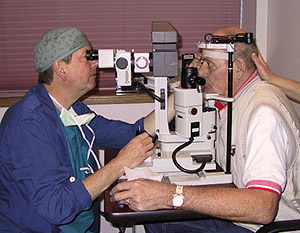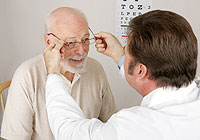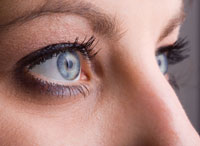- My eyes don't hurt and my vision is clear. Why should I have an eye exam?
- What is glaucoma? Am I at risk?
- What are the symptoms of macular degeneration?
- What is a cataract? Who is at risk for developing them?
- How are cataracts treated?
- What is diabetic retinopathy and how is it treated?
- Can diabetic retinopathy be prevented?
- What are the symptoms of dry eye and how is it treated?
- How does LASIK work?
- How long does the procedure take, and how long is recovery?
My eyes don't hurt and my vision is clear. Why should I have an eye exam?
 Regular eye exams are an invaluable tool in maintaining your eyes' health by detecting and preventing disease. Some diseases, such as glaucoma, develop gradually without causing pain or vision loss, so that visual symptoms may not develop until significant and irreversible damage has been done. Early detection of ocular pathology can allow for an increased number of treatment options in an attempt to prevent further harm.
Regular eye exams are an invaluable tool in maintaining your eyes' health by detecting and preventing disease. Some diseases, such as glaucoma, develop gradually without causing pain or vision loss, so that visual symptoms may not develop until significant and irreversible damage has been done. Early detection of ocular pathology can allow for an increased number of treatment options in an attempt to prevent further harm.
What is glaucoma? Am I at risk?
Glaucoma is one of the leading causes of blindness in the United States. Glaucoma is characterized by high pressure within the eye with associated damage to the optic nerve and consequent loss of peripheral vision. Symptoms include blurred vision, loss of peripheral vision, halo effects around lights and occasional painful or reddened eyes. Testing by an ophthalmologist can often detect glaucoma before symptoms appear, and early treatment may be initiated to prevent vision loss.
People at greatest risk for developing glaucoma include those patients who are over 40, diabetic, near-sighted, African-American, or who have a family history of glaucoma.
Click here for more information about glaucoma.
What are the symptoms of macular degeneration?
 Macular degeneration occurs when the macula, or central area of the retina, degrades causing a progressive loss of vision. Symptoms may include:
Macular degeneration occurs when the macula, or central area of the retina, degrades causing a progressive loss of vision. Symptoms may include:
- A gradual loss of ability to see objects clearly
- Distorted vision
- A dark or empty area appearing in the center of vision
There are two kinds of macular degeneration: "wet" and "dry." New advances in the treatment of the "wet" form of macular degeneration have significantly impacted our ability to manage this disease. Regular eye exams are highly recommended to detect macular degeneration as early as possible in an attempt to prevent permanent vision loss.
What is a cataract? Who is at risk for developing them?
A cataract is diagnosed when your natural lens, which is clear at birth and helps to focus light on the retina, becomes cloudy. There is usually no pain associated with this condition, and symptoms may include:
- Blurred/hazy vision
- Increased Glare
- A feeling of “film” over the eye(s)
Risk factors for developing cataracts may include an age of 55 years or older, a history of diabetes, history of ocular trauma, history of prior eye inflammation or disease, a family history of cataracts, history of cigarette smoking, or a history of steroid use.
Click here for more detailed information on cataract surgery.
How are cataracts treated?
Vision loss from cataracts can often initially be improved with prescription glasses and/or contact lenses. As the cataracts progress beyond the point where the vision may be corrected with glasses of contact lenses, cataract surgery may be required to maximally restore sight. Cataract surgery is one of the most common surgical procedures in the United States. During this procedure, the cloudy lens (cataract) is removed, and replaced with a clear artificial lens called an intraocular lens or IOL.
Click here for more detailed information on cataract surgery.
What is diabetic retinopathy and how is it treated?
Diabetic retinopathy is a complication of diabetes that weakens the blood vessels that nourish the retina. Vision can be affected if these weakened, irregular blood vessels leak, swell, or develop thin branches. In its advanced stages diabetic retinopathy can cause blurred or cloudy vision, floaters, blind spots, glaucoma, and possible blindness. Some of this damage is reversible, while some is irreversible. Regular screening with early detection and treatment can reverse or slow disease progression, and often prevent further vision loss. Treatment modalities include strict blood sugar control in conjunction with possible retinal laser and surgical procedures.
Can diabetic retinopathy be prevented?
Yes. People with poorly controlled or long-standing diabetes are most susceptible to developing diabetic retinopathy, however the risk is reduced with strict regulation of blood sugar levels. Maintenance of blood sugar levels is often achieved by following your prescribed diet and medications, with regular exercise, control of your blood pressure, and avoidance of alcohol and cigarettes. We at Mercer Eye Associates work closely with our patients’ primary care physicians and endocrinologists to help recognize and treat this condition. Regular eye exams with screening for retinopathy in patients with diabetes are an integral part of disease prevention and treatment.
What are the symptoms of dry eye and how is it treated?
 "Dry eye" is very common. The three main categories of dry eye include decreased tear production, increased tear loss or evaporation, and irregular tear film composition. Dry eyes have varied causes, and comprehensive ophthalmic examination can often diagnose the underlying problem and offer effective treatment.
"Dry eye" is very common. The three main categories of dry eye include decreased tear production, increased tear loss or evaporation, and irregular tear film composition. Dry eyes have varied causes, and comprehensive ophthalmic examination can often diagnose the underlying problem and offer effective treatment.
Dry eyes may develop as part of the natural aging process with changes in hormone levels and tear production. It can also form in relation to mechanical eyelid or blinking problems, certain medications such as antihistamines and oral contraceptives, environmental climate changes (low humidity, wind, dust), injury, ocular inflammation, and various systemic health conditions.
Symptoms include:
- Irritated, scratchy, dry, uncomfortable or red eyes
- A burning sensation or feeling of something foreign in your eyes
- Blurred vision
In addition to being uncomfortable, dry eyes can damage the ocular surface, scar the cornea and impair vision. Dry eye is treatable and it can often be controlled before serious harm is done to your eyes.
Treatment can take many forms based on the underlying cause. It may include lifestyle, environment, diet and medication changes and well as various tear replacement and supplementation modalities. Often small temporary plugs may be inserted into the tear ducts in the corners of the eyelids to limit tear drainage. In eyes with severe dry eye related ocular surface disease, surgery may be required.
How does LASIK work?
 LASIK corrects the way light is bent, or refracted, as it passes through the cornea so that an image is focused properly on the retina, and objects can be seen clearly. During LASIK surgery, a thin flap is cut in the surface of the cornea. The flap is temporarily lifted and an excimer laser beam is used to reshape the corneal curvature. The flap is then replaced in its original position, resulting in a cornea which has been perfectly reshaped to provide clear vision.
LASIK corrects the way light is bent, or refracted, as it passes through the cornea so that an image is focused properly on the retina, and objects can be seen clearly. During LASIK surgery, a thin flap is cut in the surface of the cornea. The flap is temporarily lifted and an excimer laser beam is used to reshape the corneal curvature. The flap is then replaced in its original position, resulting in a cornea which has been perfectly reshaped to provide clear vision.
LASIK and other type of laser corrective eye surgery is not for everyone. We at Mercer Eye associates provide a thorough pre-operative evaluation to ensure that patients are good candidates for laser vision correction, with patient safety as our number one priority.
How long does the procedure take, and how long is recovery?
The entire procedure takes only 10-20 minutes per eye, and patients are often ready to leave shortly after their surgery. The procedure itself is painless with the flap healing on its own within several days. Eye drops are taken for a short time after the surgery to control inflammation, prevent infection, and provide comfort.





